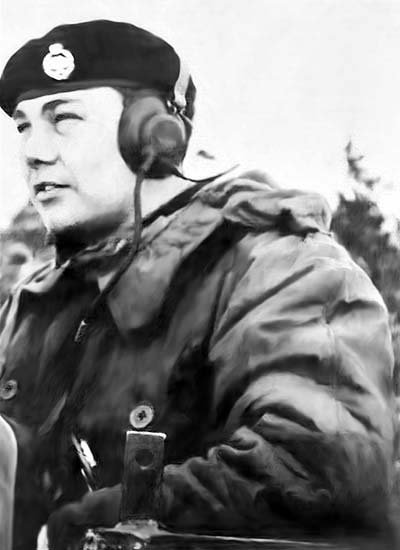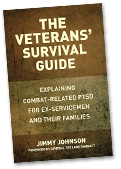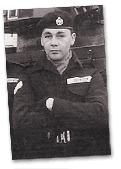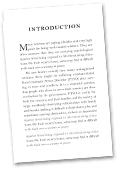 Jimmy Johnson joined the British army aged 17 and was first involved in action in Aden in the 1960’s. It was there he first demonstrated his leadership qualities which quickly led to promotion to corporal and tank commander.
Jimmy Johnson joined the British army aged 17 and was first involved in action in Aden in the 1960’s. It was there he first demonstrated his leadership qualities which quickly led to promotion to corporal and tank commander.
He was later to serve two tours of duty in Northern Ireland, during which he was involved in suppressing riots, controlling missile-throwing crowds, and clearing areas where bombs had been laid. It was there where his most traumatic experiences were to happen, those which unknowingly at the time, were to affect him most in later life.
The incident that affected him most was in Lurgan in March 1972 when a bomb was detonated in an underground toilet. A woman was killed in the explosion and Jimmy saw the grief for family members and violence at close quarters. For his actions in trying to save the woman’s life, Jimmy received a “mentioned in despatches” – an award given in recognition of exceptional heroism or other noteworthy action. It was the highest award earned by somebody in his unit since the Korean war.
In the 1970’s there was no procedures to help soldiers deal with traumatic events. There were few options available to help the soldiers wind down or de-stress. Self-medication was generally all the soldiers had and alcohol was the preferred (and generally only available) medication. “We just went to the mess and drank ourselves out of it,” says Jimmy.
Finally he could face no more conflict and, despite the best efforts of his superior officers to persuade him otherwise, he bought himself out of the army in December 1973.
Adjusting to civilian life was hard for Jimmy. He began drinking heavily and experiencing mood swings which impacted badly on his relationship with his wife and two children. He managed to find some casual work “here and there”, but without any real sense of purpose he drank more, and became more and more depressed. “I drank to dull the pain,” he says, “but it never really went away.”
Four months after his discharge, Jimmy went to have a drink in a local social club but was refused entry without an identity card, ‘You’re not a soldier now,’ they said. Nobody wanted to know me.” He walked away.
A short while later, a van pulled up alongside him. It was driven by an acquaintance who worked as a security guard. He asked Jimmy if he wanted a lift. “I had nothing planned,” he says, “and just got in.” As the van made towards the next stop on the driver’s round – a factory – it slowed down to pass a group of children playing football. Suddenly there was a loud bang on the side of the van. Jimmy thinks it was either the ball being kicked against it or a brick that had been thrown. Whatever it was, the sound triggered a horrific reaction in the former soldier. As soon as they arrived at the factory and alighted from the van, Jimmy remembers grabbing hold of his acquaintance by the arm and neck and “running him”. What he does not remember is then picking up a scaffold pole and beating the man to death with it.
Arrested the next day, Jimmy had no explanation for what he had done. “But I knew that I had killed a man. That’s why I pleaded guilty at my trial.”
For that offence he spent a little over nine years in prison before being released on licence. While inside he expressed remorse for his actions but could still not could give an explanation. He received no therapy or counselling or indeed any kind of in-depth analysis to try to ascertain why he had behaved the way he did. His army discipline combined with regulated prison life made it easy for him to present himself as a “model prisoner”.
The Guardian Erwin James: why are so many former soldiers in prison?
Tue 9 Feb 2010
[continued after the video]
SHELL SHOCK
Episode 3, Channel 4, 22nd Nov. 1998 – Broadcast on the 80th anniversary of Armistice Day.
[About Jimmy Johnson – continued]
Eighteen months after his release on licence, Jimmy killed again. A week or so before it happened, he had read a newspaper report about an army friend who had been killed in Northern Ireland and his anxieties were exacerbated. While doing some building work for a man he had worked with before, he began to feel “agitated”. He says he found himself staring out of a window, across the roofs and listening to the shrill sounds of children down below. “The next thing I knew I was hiding under a stairwell,” Jimmy says. “That’s pretty much all I remember.”
Sometime between staring out of the window and hiding under the stairs, he had picked up a lump hammer and beaten the man he was working for to death. Again he was arrested quickly and again he pleaded guilty at his trial. This time he was sentenced to life imprisonment with a recommendation from his judge that he serve a minimum term of 20 years, later raised by the home secretary to 30 years.
Yet again, little was made of Jimmy’s past military experiences, particularly those relating to his time in Northern Ireland. He knew he had killed another man and accepted his punishment. The only thing he did not know was what had triggered the two motiveless killings.
In 1985 he was transferred to Frankland prison, where he has remained ever since as high-security category A prisoner. It was in his early days at Frankland that he met and became friends with a fellow “cat A” also serving life – a man who had been an eminent medical doctor on the outside. He was interested to hear about Jimmy’s military experiences. “He said to me that he thought I was suffering from PTSD,” Jimmy says. “That was the first time I’d heard of it. He also gave me the contact details of a former colleague of his who specialised in it. So I wrote to him. This other doctor wrote back and explained that he had helped many ex-servicemen with various levels of trauma exposure, but I was the first he had heard of in prison. His letter was a godsend to me. Suddenly I had some understanding of what might have been going on.”
Since 1996, Jimmy has spent his years in prison collating as much information as he could on PTSD and its effects on the mind. He has written this book in the hope that it will help other servicemen and their families understand the effects of war on their minds in the hope they do not follow in his footsteps.
- Excerpts and quotes from The Guardian Newspaper



